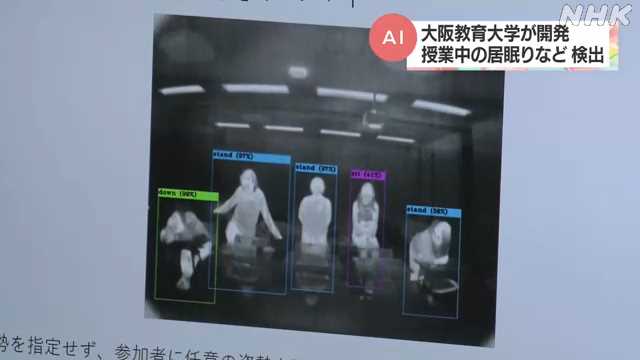An article published by the NHK that reports on an AI system developed to detect when student doze off during classes has been causing waves among the Japanese public, as people question its ethicality and potential misuses. On the other hand, an overwhelming voice to proactively implement the system in the National Diet of Japan can be heard, as thousands of users echo the opinion that national representatives dozing off during work is a lot more of a pressing matter than students having a nap during their lessons.

The system in question was developed by professors of Osaka Kyoiku University in Japan, a national university that specializes in educating teachers. The system uses artificial intelligence and a thermal camera that can measure the body temperature of multiple people at once and performs analysis of the subjects’ body postures. According to the developers of the system, it was created as a means to collect data about the frequency and timing of students dozing off or getting up from their seats during classes, with the goal of improving the content of lessons. In a real-life trial run, the system achieves over 90% accuracy in differentiating between the three actions of sitting down, standing up and resting one’s upper body on a desk.
In a press conference, the leader of the project professor Fumio Nakaya explained that the system is meant to facilitate data collection which is to be used to train educators and improve the quality of lesson plans. He also mentioned that as the thermal camera cannot capture the subjects’ faces, the privacy of students is not in jeopardy.
Though the developers’ intentions seem to be scientific more than anything, reactions from the Japanese public were understandably mixed, with many finding the idea of monitoring students in this way unsettling and feeling that things might be heading into a “dystopian” direction. Above all, most users seemed to agree on the sentiment that napping students should not be treated as a problem and should be left alone.
While some found potential positive uses of the AI system, such as to alert drowsy drivers and prevent traffic accidents, some also hypothesized on potential misuses, such as the system eventually becoming a basis of evaluating students and harming their performance. The possibility of the system contributing to better lesson content was also deemed dubious by some, as students sleeping can be caused by exhaustion from working part-time or extracurricular activities and have nothing to do with the educator’s skills or lesson plan.
As opposed to students napping during lessons they paid for themselves at their own responsibility, members of the National Diet of Japan frequently dozing off during assemblies while receiving taxpayer money seems to be a lot more on the public’s mind. This can be seen from the tremendous voice to introduce the new AI system into the National Diet rather than schools.
Starting from celebrities such as Beat Kiyoshi, users chimed in one by one to second the opinion, with most comments on X (formerly Twitter) in reaction to the article mentioning the National Diet in one way or another.
Government: Hey, is your system experiencing some kind of bug?
Osaka Kyoiku Uni: No, it’s working completely normally?
Government: But it’s saying 100% (of the members) are sleeping, that can’t be, right?
Osaka Kyoiku Uni:
Though the “initiative” to monitor the nap times of Diet members is obviously a large joke, it’s definitely a telling sign that the problem of national representatives catching z’s on duty in Japan is larger than anyone could have assumed. A quick YouTube search of the words “National Diet sleeping” reveals an abundance of embarrassing videos of Diet members being caught dozing off mid-assembly and scrolling away on their phones, as well as awkward interviews of them being confronted about it.
Though news of the AI system designed to detect students dozing off or stepping away from their desks was overpowered by humorous calls for it be used in the Diet, it remains as something that could potentially be used in classrooms in the future, and many are far from comfortable with the idea. A recently reported AI system that identifies “employees who are likely to resign early” at the hiring stage also caused negative reactions from the Japanese public for the potential issues it can cause. With the advancement of AI technology, fears of ethics and privacy being jeopardized are undoubtedly growing as well.





